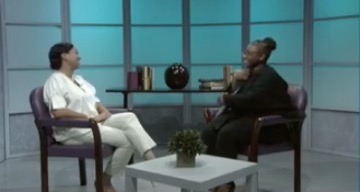The University of the District of Columbia (UDC) television studios, UDCtv, provides the Washington, DC area with programming geared to foster health, political and environmental awareness. Dr. Katherine Marshall Woods hosts this UDCtv show entitled “A Healthy Mind” featuring guests from a myriad of professions lending information to promote healthy living and lifestyles. Entries entitled: “A Healthy Mind” share these interviews.

On October 29, 2019, Dr. Paris Gasque, was invited onto the show to discuss the facets of trauma within the education field. With over 20 years of experience working with children through education, Dr. Gasque has performed curriculum design, developed treatment and behavior intervention plans, facilitated psychological and developmental test analysis of child behavior, and more. Dr. Gasque is currently the Chief of Well Being at Monument Academy Public Charter School and is also an Adjunct professor at Howard University. Dr. Gasque founded The Amachi Foundation LLC in 2010. The Amachi Foundation provides therapy services to promote emotional adjustments, social competences and psychiatric stability.
……
Dr. Marshall Woods: “Hello, my name is Dr. Katherine Marshall Woods, adjunct professor of psychology at The George Washington University, and your host for this edition of A Healthy Mind. The purpose of this video series is to educate and inform the public about mental health, from public policy and environmental factors to the various disorders that affect healthy minds.”
“Judith Herman, within her book Trauma & Recovery defines psychological trauma as “Bearing witness to horrible events…” What is the impact of trauma on our young children? How does trauma influence their ability to access educational experiences; interpersonal connections?”
“ I will explore these important questions and others with our guest Dr. Paris Gasque. Dr. Gasque is an educator, therapist and social activist for justice and equal opportunities for youth who are at risk for poverty, criminality, and disparities. She has served as a special education teacher, a special education supervisor, school psychologist, assistant principal, adjunct professor, and continues to serve youth families and future practitioners as owner of Amachi Foundation LLC and as Director of Well-Being at a local Public Charter school. Welcome to A Healthy Mind. Thank you so much for coming.”
Dr. Paris Gasque: “Your very welcome.”
Dr. Marshall Woods: “So tell me a little about yourself, you’ve done so many things. What was your trajectory for getting where you are?”
Dr. Paris Gasque: “Well, I can honestly say, I don’t know that I predicted that I would be where I am now. I knew that I loved children, and I knew that I wanted to help others. And, I think as I got into the profession, education, while I started out as a case manager, and then got into the field of education; the opportunities just kinda came my way. And, I was more pushed, umm, “nudged”, I’ll say into certain roles and took on certain responsibilities. But, I find that my education and social work and mental health background, psychology; I do have these layers, have come in hand, they work very in sync with one another. And, I’ve been able to reach families and children in ways that I may not have been able to had I not had the background, the academic and a great understanding of human development in general to make those genuine connections with families and children. So, it’s been very interesting, I will not sit here and say that I planned to be where I am, but this is where I am and this is where the universe saw fit. And I have made the best of it.”
Dr. Marshall Woods: “(Laughs)” “So tell me what are you seeing now within the schools, you’re at a local public charter school, what is that like for you there?”
Dr. Paris Gasque: “It’s a big switch for me, because I have worked in the traditional public school setting for many years. And, we know that those structures are very solid and sometimes that’s a good thing, and not so good when we are dealing with bureaucracy. But, the charter school world gives a lot more flexibility. However, the school that I am currently supporting we cater to individuals who have been exposed to trauma and who have had challenges in their traditional schools. And, while we have a smaller load, we are able to manage the number of students that we accept into the program, we have to be a lot more creative and a lot more available to ensuring that our students are safe mentally, and spiritually, physically as well. So, it can be a bit demanding; but, it’s also rewarding in that we get to utilize many resources that may not have been available in a different setting. That part I can really appreciate.”
Dr. Marshall Woods: “So when you say trauma, that they have experienced that, what do you mean by that? Umm, Is it that they have hurt themselves physically, and that’s a trauma? Or is there something happening for them emotionally, or something has happened to them that was a trauma? Or is it more long-term difficulties? What do we mean by trauma?”
Dr. Paris Gasque: “So it’s a variety. I think we have many students who have been, again, exposed to physical, sexual, emotional trauma. We have students that are experiencing suicidal ideation, and have made attempts. Umm, we have students that are just so hurt that they find it difficult to trust others and, so that may come from a number of factors. But, we understand that most individuals that present in that way are trying to protect themselves, they are trying to survive. And again, some of these experiences we are aware of and others we aren’t, But, the symptoms are pretty similar ,and we just treat them and try to build those relationships with the students until they are able to trust us enough to share their experiences.”
Please visit https://youtu.be/LK9ZrcghmxA to see the remaining portion of this interview.

